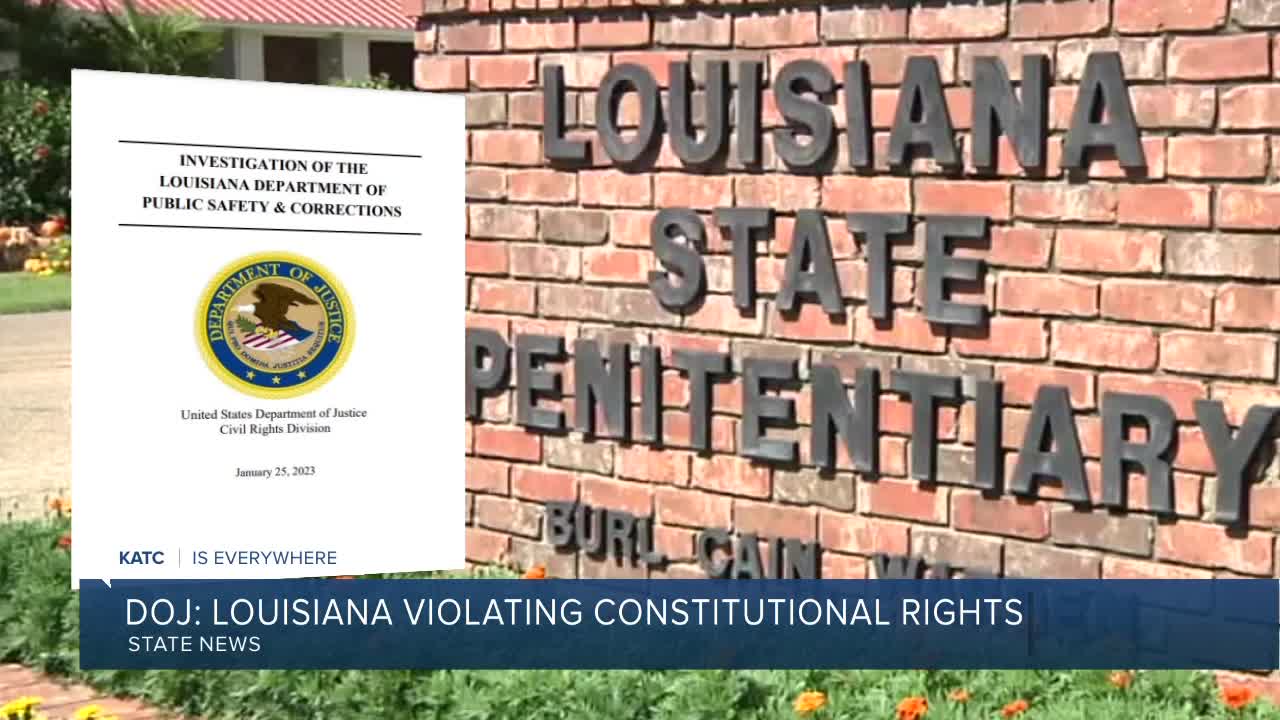Louisiana is "routinely" violating the Constitutional rights of its citizens by holding people in jail past their legal release dates, federal officials say.
The U.S. Justice Department announced today that it has concluded there is reasonable cause to believe that the Louisiana Department of Public Safety and Corrections (LDOC) routinely confines people in its custody past the dates when they are legally entitled to be released from custody, in violation of the Fourteenth Amendment.
Specifically, the department concluded that:
1) LDOC denies individuals’ due process rights to timely release from incarceration;
2) LDOC’s failure to implement adequate policies and procedures causes systemic overdetentions; and
3) LDOC is deliberately indifferent to the systemic overdetention of people in its custody.
The investigators are still gathering information; individuals with relevant information are encouraged to contact the Justice Department by phone at 1-833-492-0097, or by email at community.louisianadoc@usdoj.gov.
In a letter to Gov. John Bel Edwards, the DOJ wrote that a lawsuit could be filed within 50 days.
"We are obligated to advise you that 49 days after issuance of this notice, the Attorney General may initiate a lawsuit under CRIPA to correct the alleged policies and procedures we have identified, if LDOC officials have not satisfactorily addressed them. 42 U.S.C. § 1997b(a)(1). The Attorney General may also move to intervene in related private lawsuits 15 days after issuance of this letter. 42 U.S.C. § 1997c(b)(1)(A). It is our hope, however, to resolve this matter through a more cooperative approach. We look forward to working with you to address the alleged violations of law we have identified," the letter states.
The DOJ alleges that, for more than 10 years, LDOC has been on notice of its overdetention problem and has failed to take adequate measures to ensure timely releases of incarcerated individuals from its custody, the feds allege. Between January and April 2022 alone, 26.8% of the people released from LDOC’s custody were held past their release dates. Of those overdetained people, 24% were held over for at least 90 days, and the median number of days overdetained was 29.
In just this four-month period, LDOC had to pay parish jails an estimated $850,000, at a minimum, in fees for the days those individuals were incarcerated beyond their lawful sentences. At that rate, this unconstitutional practice costs Louisiana over $2.5 million a year.
As required by the Civil Rights of Institutionalized Persons Act (CRIPA), the department provided LDOC with written notice of the supporting facts for these findings and the minimum remedial measures necessary to address them.
“The Constitution guarantees that people incarcerated in jails and prisons may not be detained beyond their release dates, and it is the fundamental duty of the State to ensure that all people in its custody are released on time,” said Assistant Attorney General Kristen Clarke of the Justice Department’s Civil Rights Division. “Our investigation uncovered evidence of systemic violations by the Louisiana Department of Public Safety and Corrections that have resulted in the routine confinement of people far beyond the dates when they are legally entitled to be released. We are committed to taking action that will ensure that the civil rights of people held in
Louisiana’s jails and prisons are protected. We stand ready to work with state officials to institute long overdue reforms.”
Incarceration is a part of the justice system, but it needs to be done correctly, said Western District U.S. Attorney Brandon B. Brown.
“Persons are legally incarcerated every day in America and are ordered by the court to serve certain sentences primarily for punishment, deterrence and rehabilitation purposes,” Brown said. “This ultimately benefits the individual, society and the criminal justice system. There is an obligation both to incarcerated persons and the taxpayers not to keep someone incarcerated for longer than they should be. This can be costly from a physical and mental standpoint for the incarcerated individual and a waste of money for the taxpayer. Timely release is not only a legal obligation, but arguably of equal importance, a moral obligation. We look forward to working with the Louisiana Department of Corrections to ensure that it has the policy and tools going forward to prevent overdetention from reoccurring.”
The Justice Department initiated the investigation in December 2020 under CRIPA, which authorizes the Department to take action to address a pattern or practice of deprivation of legal rights of individuals confined to state or local government-run correctional facilities.
We have reached out to the state DOC for a response and will update this story as soon as we receive a response.
Here's the report and the letter to the governor, if you'd like to read them for yourself:
For more information about the Civil Rights Division and the Special Litigation Section, please visit: https://www.justice.gov/crt/special-litigation-section. You can also report civil rights violations to the Civil Rights Division by completing a complaint form available at: https://civilrights.justice.gov/.
Additional information about the Eastern, Middle, and Western U.S. Attorneys Offices is available at: https://www.justice.gov/usao-edla , https://www.justice.gov/usao-mdla , and https://www.justice.gov/usao-wdla.



